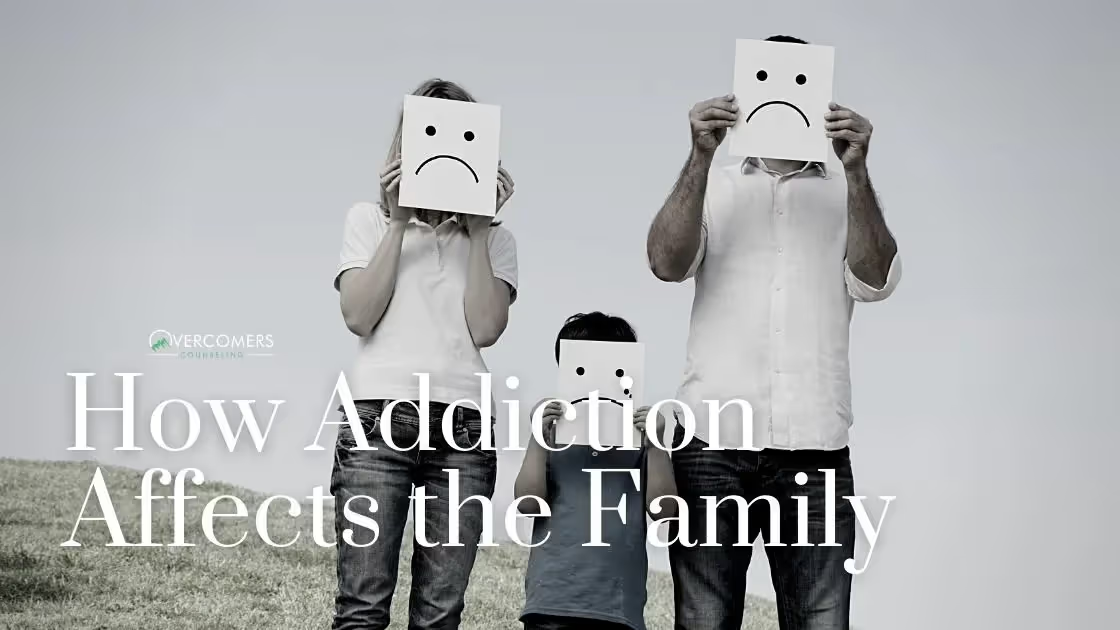One of the most tragic things about addiction is how addiction affects the family. It doesn't just harm the person who is addicted, it harms everyone who...

One of the most tragic things about addiction is how addiction affects the family.
It doesn't just harm the person who is addicted, it harms everyone who cares about them.
Especially their family members.
Addiction affects the family in many ways.
It harms relationships by causing mistrust on one side and shame on the other.
If the addict is a parent, it can threaten the basic security of the family.
They might lose their job or home which will affect their children's basic sense of safety.
Studies show that children who have parents who struggle with addiction are much more likely to struggle with it themselves.
This isn't a guarantee though.
And, there are behavioral reasons that might play into this link.
For example, a child might turn to substances to deal with the pain, uncertainty, or even abuse that comes with having an addicted parent.

Addiction affects family relationships by putting strain on them.
Addiction often creates sources of strain in relationships like mistrust and financial problems.
If an addict becomes unable to hold down a job then they can become a financial strain on the family.
Addiction also causes breakups in the family as each family member may choose to deal with the addiction problem differently.
Some family members may pull away emotionally or physically to avoid dealing with the addict.
This disengagement might make other family members feel abandoned or forced to choose sides.
Another common reaction of family members is to take an overactive role by trying to control the addict's behavior.
They might demand that the addict seek treatment or leave the family home.
They might become responsible for picking the addict up late at night or loaning them money when they need it.
Often the addict will lean on these members heavily which causes other family members to further disengage.
Some family members, especially those who loathe confrontation, might try to play the middle man or refuse to say no while not disengaging.
This is commonly referred to as enabling behavior; behavior that allows an addict to continue their addiction without consequences.

Addiction is often hardest on children. Unfortunately, research shows that 1 in 8 children in the United States live with an addicted parent.
The effects of addiction on children depend on what type of household they come from: a single parent or two-parent household and how many parents struggled with addiction.
For example, a child of a single parent who is an addict is alone with them a lot of the time.
They grow up without having someone to talk to about their addicted parent's behavior and may internalize it as normal.
Whereas, a child with two parents and one who is sober has someone in the home to turn to for support and guidance.
Children who grow up with an addicted parent receive less guidance as children.
They typically receive less support, less encouragement,
and less emotional connection.
They often experience emotional neglect as a parent is wrapped up in their addiction.
Children who grow up with addicted parents typically have lower levels of self-confidence, impeded social development, and higher risks of health problems and mental illnesses.
In some cases, children with addicted parents may experience abuse.
In fact, addiction is one of the largest risk factors for child abuse in the home.
There is a much higher risk of a child being abused by a parent who is an addict.
Children, like other family members, respond to addiction differently.
In some cases, the child might try to take control and become "parentified;" meaning they take on the role of the parent and their addicted parent takes on the role of the child.
Children might also emotionally disengage from their parents and immerse themselves in other realities like books, video games, or start abusing substances themselves.
How Addiction Affects Parents
Parents who have an addicted child have a different set of issues.
Many parents with addicted children experience guilt that they are responsible.
They might also feel shame and worry about how friends and community members might respond.
There's also the tremendous anxiety that comes with being the parent of an addict.
You worry about their safety constantly. You feel pain as you watch them suffer.
Parents with addicted children should definitely seek counseling for some of these painful experiences.
Like in most relationships with an addict, there are two main ways that people respond: disengaging or over-responding by trying to control.
Parents may try stopping contact or intervening and trying to take care of them.
Many parents end up raising grandchildren whose parents are addicts.
If this is the case, they will all need support to heal.
Addiction affects the family in many ways: most of which are extremely difficult.
Don't allow your family to be torn apart by addiction.
Seeking counseling for family members who are not the addict is critical and necessary.
The addict isn't the only person in the family who suffers.
Make sure everyone is taken care of.
The best way to help an addict without enabling them is by setting boundaries and getting help for yourself. It is important to remember that you cannot control the addict's behavior, but you can offer support and understanding. With time and patience, you can help your loved one recover from addiction.
Some resources for family members of addicts include therapy, counseling, 12-step programs, and other support groups. It is important to seek out these resources to get the tools you need to deal with your loved one's addiction. You can also find help for yourself through these resources.
If you think you might be struggling with alcohol abuse, the first step is to talk to your doctor. Your doctor can help you assess your drinking habits and recommend treatment options. There are also many different types of treatment programs available for alcohol abuse, so you can find one that fits your needs and circumstances. Additionally, support groups can be a valuable resource for anyone struggling with alcohol abuse. These groups provide a safe space to share your experiences and connect with others who are facing similar challenges.
Alcoholism refers to a disease that is characterized by a strong craving for alcohol and an inability to control one's drinking.
Treatment for alcohol abuse often includes counseling, support groups, and medication. With the right help, your spouse can recover from alcoholism and go on to lead a healthy and happy life.
Some common signs of alcohol abuse include drinking more than intended, neglecting responsibilities, and continuing to drink despite negative consequences